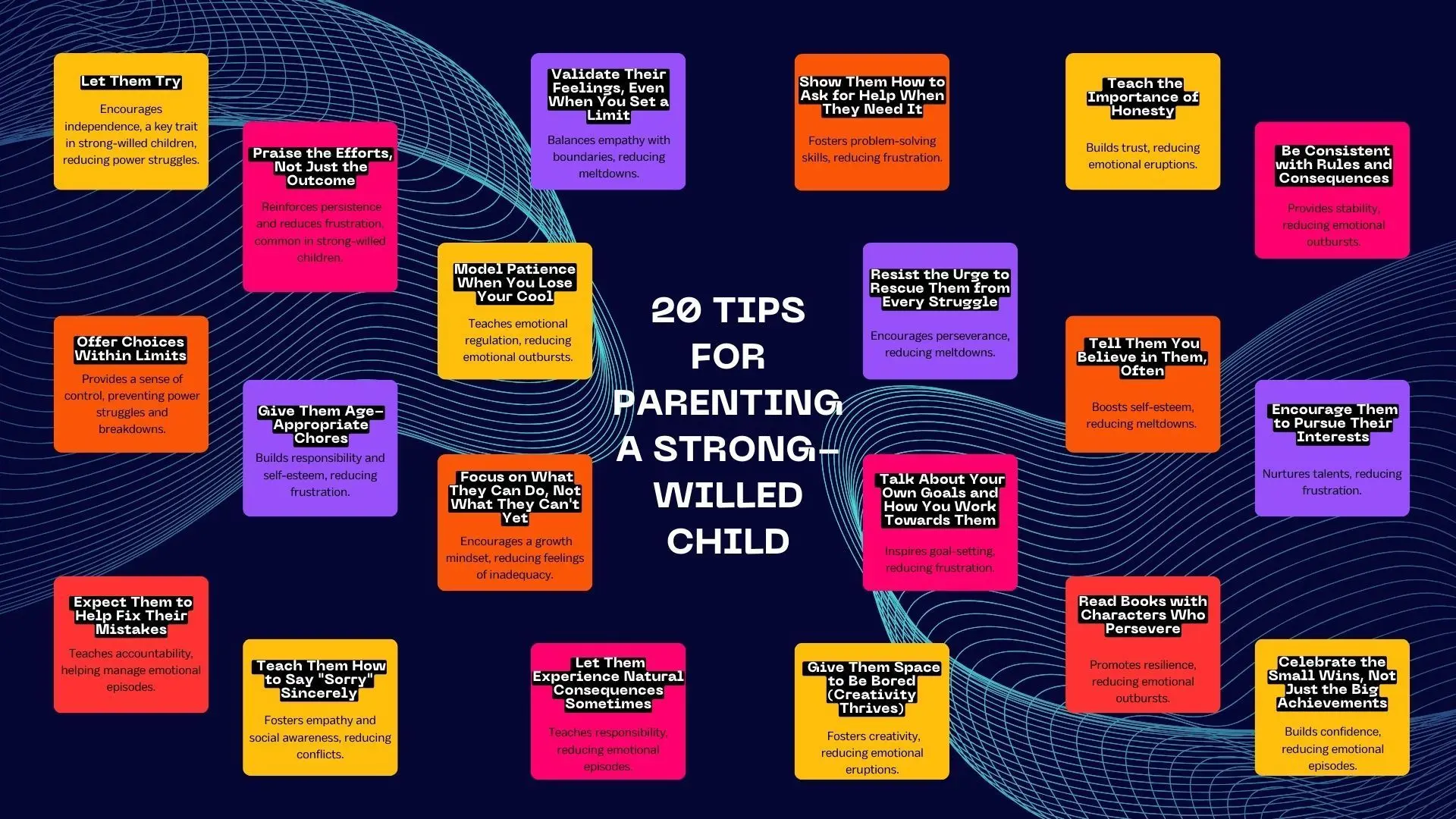Struggling with parenting a strong-willed child? Find 20 actionable tips for managing conflicts, building responsibility, and celebrating their uniqueness.

Parenting a strong-willed child can sometimes feel like an uphill struggle. You may have heard that your tenacious, persistent, and negotiating go-getter is developing the skills needed to become a great leader in the future, but managing their constant requests, boundless energy, and power plays can be overwhelming.
These determined, independent, and spirited children often bring both immense challenges and great rewards. To help you navigate this journey, here are 20 actionable tips for parenting a strong-willed child, designed to foster confidence, discipline, and a positive parent-child relationship.

In This Blog
Toggle1. Let Them Try
Encouraging your child to attempt tasks on their own fosters independence and resilience. When you allow your child to tie their own shoes, even if it takes longer, you are teaching them perseverance and self-reliance. Applauding their efforts, rather than focusing solely on the outcome, builds their confidence and reduces frustration, which can lessen tantrums. This is essential in parenting a strong-willed child.
2. Praise the Efforts, Not Just the Outcome
Focusing on your child’s hard work and persistence rather than the end result helps them understand the value of effort. When you praise your child for practicing the piano diligently, rather than just their performance at the recital, they learn that effort is important. This recognition can motivate them to keep trying, even when things are tough, reducing frustration and emotional meltdowns.
3. Offer Choices Within Limits
Providing options that are acceptable to you gives your child a sense of control while maintaining necessary boundaries. Letting your child choose between two healthy snacks, like apples or carrots, empowers them and reduces power struggles. This sense of control can prevent breakdowns by making them feel heard and respected. This approach is very effective in parenting a strong-willed child.
4. Give Them Age-Appropriate Chores
Assigning tasks that match your child’s capabilities helps build responsibility and self-esteem. Asking your 5-year-old to help set the table or your 10-year-old to sort laundry gives them a sense of accomplishment. When children feel competent and valued, they are less likely to act out in frustration.
5. Expect Them to Help Fix Their Mistakes
Teaching your child accountability by involving them in solving problems they create helps them understand the consequences of their actions. If your child spills juice, having them help clean it up teaches responsibility. This understanding can reduce the likelihood of emotional episodes, as they learn to cope with the outcomes of their actions constructively. This technique is crucial in parenting a strong-willed child.
6. Teach Them How to Say “Sorry” Sincerely
Guiding your child in expressing genuine apologies helps them understand the impact of their actions on others. Encouraging your child to apologize sincerely to a friend with a heartfelt explanation fosters empathy and social awareness. This can improve their relationships and reduce conflicts that lead to emotional eruptions. This is a valuable skill in parenting a strong-willed child.
7. Validate Their Feelings, Even When You Set a Limit
Acknowledging your child’s emotions while maintaining boundaries shows that you respect their feelings. Saying, “I understand you’re upset that you can’t stay up late, but bedtime is important for your health,” validates their feelings and sets a clear limit. This balance can help reduce the frustration that often leads to meltdowns. This approach is vital in parenting a strong-willed child.
8. Model Patience When You Become Upset (It Happens to All of Us)
Demonstrating how to handle frustration calmly and apologizing when necessary shows your child how to manage their emotions. If you Raise your voice, take a deep breath, apologize, and explain how you will try to remain calm, models effective emotional regulation. This can help your child learn to handle their own frustrations without resorting to tantrums.
9. Highlight What They Can Do Instead of What They Can’t Do Yet
Emphasizing your child’s strengths and potential rather than their current limitations fosters a growth mindset. Saying, “You’re doing great with addition! Soon, you’ll get the hang of subtraction too,” encourages them to keep trying and improves self-confidence. This positive focus can reduce feelings of inadequacy that might lead to breakdowns. This is an important strategy in parenting a strong-willed child.
10. Let Them Experience Natural Consequences Sometimes
Allowing your child to learn from the outcomes of their actions in a safe environment helps them understand responsibility. If your child forgets their homework, letting them face the consequences at school teaches them the importance of responsibility. Experiencing natural consequences can reduce emotional episodes by helping them understand the real-world effects of their actions.
11. Show Them How to Ask for Help When They Need It
Teaching your child that seeking help is a sign of strength, not weakness, encourages them to address challenges constructively. Encouraging your child to ask a teacher for clarification if they don’t understand an assignment fosters problem-solving skills. This can reduce frustration and the likelihood of emotional outbursts when they face difficulties.
12. Resist the Urge to Rescue Them from Every Struggle
Allowing your child to navigate challenges helps them develop problem-solving skills. If your child struggles with a puzzle, offering hints rather than solving it for them teaches perseverance. This approach reduces meltdowns by encouraging them to overcome obstacles independently.
13. Talk About Your Own Goals and How You Work Towards Them
Sharing your personal experiences with setting and achieving goals can inspire your child and show them the value of hard work. Discussing how you plan your work projects and the steps you take to complete them helps your child understand the process of goal-setting. This can motivate them to work towards their own goals, reducing frustration and emotional episodes. This is an important approach in parenting a strong-willed child.
14. Give Them Space to Be Bored (Creativity Thrives)
Allowing your child downtime encourages creative thinking and self-directed play. Setting aside time without structured activities and providing materials for imaginative play, like art supplies, fosters creativity. This can reduce emotional eruptions by giving them an outlet for their energy and imagination. This is a beneficial tactic in parenting a strong-willed child.
15. Read Books with Characters Who Persevere
Choosing stories that highlight perseverance and determination can inspire your child. Reading “The Little Engine That Could” and discussing the character’s persistence encourages them to keep trying even when things are tough. This can reduce emotional outbursts by promoting a positive, resilient mindset.
16. Celebrate the Small Wins, Not Just the Big Achievements
Recognizing and celebrating everyday successes builds confidence and motivation. Praising your child for completing their homework or helping a sibling reinforces positive behavior. Celebrating small wins can reduce emotional episodes by encouraging them to see their progress and achievements. This is a crucial aspect of parenting a strong-willed child.
17. Tell Them You Believe in Them, Often
Regularly expressing your confidence in your child’s abilities and potential boosts their self-esteem. Frequently saying, “I know you can do it. I believe in you!” reassures them of your support. This affirmation can reduce meltdowns by building their confidence and willingness to face challenges.
18. Encourage Them to Pursue Their Interests
Supporting your child’s passions and providing opportunities for them to explore their interests is crucial. If your child loves painting, providing art supplies and encouraging them to create regularly nurtures their talents and passions. Pursuing interests can reduce frustration and emotional episodes by giving them a fulfilling outlet for their energy. This is an important strategy in parenting a strong-willed child.
19. Teach the Importance of Honesty
Fostering a culture of honesty by being truthful and expecting the same from your child builds trust. If your child breaks a toy, discussing the importance of telling the truth reinforces the value of honesty. This can reduce emotional eruptions by encouraging open communication and trust.
20. Be Consistent with Rules and Consequences
Maintaining consistent rules and consequences provides a stable and predictable environment. If bedtime is 8 PM, ensuring it remains the same each night with consistent consequences for not following it helps your child understand and respect boundaries. Consistency can reduce emotional outbursts by providing a clear, predictable structure. This is an essential approach in parenting a strong-willed child.
Conclusion of Parenting a strong-willed child
By implementing these 20 tips for parenting a strong-willed child, you can foster a confident and disciplined child, capable of navigating life’s challenges with resilience and determination. Remember, consistency, empathy, and patience are key. Embrace their uniqueness and see them flourish.
This approach to parenting a strong-willed child not only helps in raising a confident and disciplined individual but also reduces the frequency and intensity of emotional outbursts, making your parenting journey smoother and more fulfilling.
So what tip do you like most? Let me know in the comment section!
You may also be interested in : Discipline and ADHD: 6 Practical Solutions for Parents in 2024
FAQs
1. What is a strong-willed child?
A strong-willed child is determined, independent, and full of energy. They often display a high level of persistence, a desire for control, and a strong sense of individuality. Understanding these traits helps in effectively parenting a strong-willed child.
2. How can I manage conflicts with my strong-willed child?
To manage conflicts, offer choices within limits, validate their feelings, and maintain consistent rules. These strategies provide structure while respecting their need for independence.
3. Why is it important to praise efforts instead of outcomes?
Praising efforts encourages perseverance and a growth mindset. It helps children understand the value of hard work and reduces frustration, crucial for parenting a strong-willed child.
4. How do I teach my strong-willed child responsibility?
Assign age-appropriate chores and expect them to help fix their mistakes. These tasks build responsibility and self-esteem, essential for parenting a strong-willed child.
5. What are natural consequences and how do they help?
Natural consequences are outcomes that occur naturally from a child’s actions. They teach responsibility and help children understand the real-world effects of their behavior, aiding in parenting a strong-willed child.
6. How can I foster independence in my strong-willed child?
Encourage them to try tasks on their own, offer choices within limits, and provide space to be bored. These actions promote independence and reduce power struggles.
7. What should I do when my child becomes frustrated?
Validate their feelings, model patience, and guide them in asking for help. These strategies help manage frustration and emotional episodes, making parenting a strong-willed child easier.
8. How can I build my child’s confidence?
Focus on their strengths, celebrate small wins, and frequently express your belief in their abilities. Building confidence is key to parenting a strong-willed child successfully.
9. Why is consistency important in parenting a strong-willed child?
Consistency in rules and consequences provides stability and predictability. This structure helps strong-willed children understand boundaries and reduces emotional outbursts.
10. How can reading help my strong-willed child?
Reading books with characters who persevere inspires resilience and determination. It reinforces positive behavior and a growth mindset, beneficial for parenting a strong-willed child.




